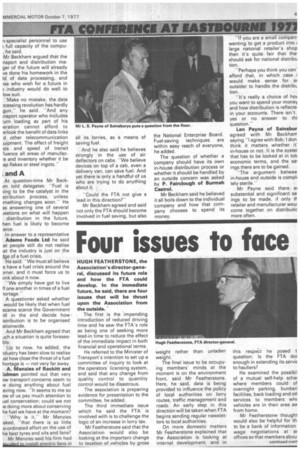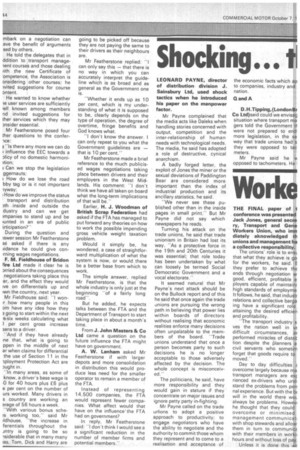Four issues to face
Page 45

Page 46

If you've noticed an error in this article please click here to report it so we can fix it.
HUGH FEATHERSTONE, the Association's director-general, discussed its future role and how the ETA could develop. In the immediate future, he said, there are four issues that will be thrust upon the Association from the outside. s
The first is the impending introduction of reduced driving time and he saw the FTA's role as being one of seeking more lead-in time to reduce the effect of the immediate impact in both financial and operational terms.
He referred to the Minister of Transport's intention to set up a committee of inquiry to look at the operators' licensing system, and said that any change from quality control to quantity control would be disastrous.
The association is preparing evidence for presentation to the committee, he added.
The third immediate issue which he said the FTA is involved with is to challenge the logic of an increase in lorry tax.
Mr Featherstone said that the Association would also be looking at the important change to taxation of vehicles by gross weight rather than unladen weight.
The final issue to be occupying members' minds at the moment is on the environment front, said Mr Featherstone. Here, he said, data is being provided to influence the policy of local authorities on lorry routes, traffic management and roads. An early step in this direction will be taken when FTA begins sending regular newsletters to local authorities.
On more domestic matters Mr Featherstone explained that the Association is looking at internal development, and in this respect he posed t question: Is the FTA doi enough in extending its servic to hauliers?
He examined the possibil of a mutual self-help schei where members could of overnight parking, bunkeri facilities, back loading and otl services to members whc vehicles are in their area avk from home.
Mr Featherstone thoughi would also be helpful for tb to be a bank of information wage negotiations at ar offices so that members abou mbark on a negotiation can ave the benefit of arguments sed by others.
He told the delegates that in ddition to transport managelent courses and those dealing nth the new Certificate of ompetence, the Association is onsidering other courses; he witeci suggestions for course antent.
He wanted to know whether le user services are sufficiently rell known among members NI invited suggestions for ther services which they may prisider essential.
Mr Featherstone posed four ther questions to the confer ) "Is there any more we can do influence the EEC towards a plicy of no domestic harmoni&on; Can we stop the legislation ggernauts; How do we lose the road bby tag or is it not important iyway; 1How do we improve the status transport and distribution )th inside and outside the dustry and can we • get )mpanies to stand up and be iunted in an era of public irticipation?"
During the question and iswer session Mr Featherstone as asked if there is any ,idance he could give con • rning wages negotiations.
F. M. Fieldhouse of Bridon Fire Ltd made it clear he is arried about the consequences negotiations taking place this ,ar, and the effect they would lye on differentials up and iwn the country, next year.
Mr Fieldhouse said: "I won • r how many people in this am have any idea how they a going to start within the next e-six weeks calculating what ) per cent gross increase 3ans to a driver.
And if they have already ,ne that, what is going to ppen in the middle of next ar when claims for differential the use of Section 11 in the -)ployment Protection Act are Dug ht in.
"In many areas, as some of know, a driver's base wage is 0 for 40 hours plus £6 plus e per cent on the number of urs worked. Many drivers in s country are working an arage of 56 hours a week.
"With various bonus sche:s working too," said Mr ildhouse, "the increase in ferentials throughout the „miry is going to be so isiderable that in many many :as, Tom, Dick and Harry are going to be picked off because they are not paying the same to their drivers as their neighbours are.
Mr Featherstone replied: "I can only say this — that there is no way in which you can accurately interpret the guideline which is as broad and as general as the Government one is.
"Whether it ends up as 10 per cent, which is my understanding of what it is supposed to be, clearly depends on the type of operation, the degree of overtime, fringe benefits and God knows what.
"I don't know the answer. I can only repeat to you what the Government guidelines are — that is 10 per cent."
Mr Featherstone made a brief reference to the much publicised wages negotiations taking place between drivers and their employers in the West Midlands. His comment: "I don't think we have all taken on board what the long-term implications of that will be."' Earlier, H. J. Woodman of British Scrap Federation had asked if the FTA has managed to put forward any theories on how to work the possible impending gross vehicle weight taxation problem.
Would it simply be, he wondered, a case of straightforward multiplication of what the system is now, or would there be a better base from which to work.
The simple answer, replied Mr Featherstone, is that the whole industry is only just at the beginning "of a fairly long road".
But he added, he expects talks between the FTA and the Department of Transport to start taking place in about a month's time.
From J. John Masters & Co Ltd came a question on the future influence the FTA might have on government.
A. W. Lanham asked Mr Featherstone if with larger depots and more consolidation in distribution this would produce less need for he smaller operator to remain a member of the FTA.
Instead of representing 14,500 companies, the FTA would represent fewer companies. What affect would that have on the influence the FTA had on government?
In reply, Mr Featherstone said: "I don't think I would see a a significant reduction in the number of member firms and potential members."












































































































